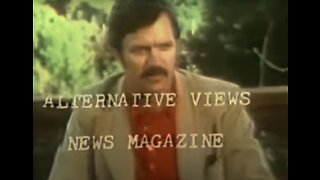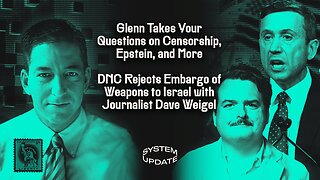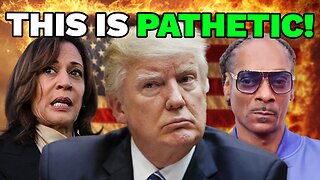Premium Only Content

"The Worst of the Worst of the FBI": Surveilling the Private Life of Martin Luther King (1987)
Originally premiered on December 3, 2022
The Story Behind the FBI MLK Suicide Letter: https://www.patreon.com/thememoryhole_
FBI director J. Edgar Hoover personally ordered surveillance of King, with the intent to undermine his power as a civil rights leader.[404][405] The Church Committee, a 1975 investigation by the U.S. Congress, found that "From December 1963 until his death in 1968, Martin Luther King Jr. was the target of an intensive campaign by the Federal Bureau of Investigation to 'neutralize' him as an effective civil rights leader."[406]
In the fall of 1963, the FBI received authorization from Attorney General Robert F. Kennedy to proceed with wiretapping of King's phone lines, purportedly due to his association with Stanley Levison.[407] The Bureau informed President John F. Kennedy. He and his brother unsuccessfully tried to persuade King to dissociate himself from Levison, a New York lawyer who had been involved with Communist Party USA.[408][409] Although Robert Kennedy only gave written approval for limited wiretapping of King's telephone lines "on a trial basis, for a month or so",[410] Hoover extended the clearance so his men were "unshackled" to look for evidence in any areas of King's life they deemed worthy.[115]
The Bureau placed wiretaps on the home and office phone lines of both Levison and King, and bugged King's rooms in hotels as he traveled across the country.[408][411] In 1967, Hoover listed the SCLC as a black nationalist hate group, with the instructions: "No opportunity should be missed to exploit through counterintelligence techniques the organizational and personal conflicts of the leaderships of the groups ... to insure [sic] the targeted group is disrupted, ridiculed, or discredited."[405][412]
In a secret operation code-named "Minaret", the National Security Agency monitored the communications of leading Americans, including King, who were critical of the U.S. war in Vietnam.[413] A review by the NSA itself concluded that Minaret was "disreputable if not outright illegal."[413]
CIA files declassified in 2017 revealed that the agency was investigating possible links between King and Communism after a Washington Post article dated November 4, 1964, claimed he was invited to the Soviet Union and that Ralph Abernathy, as spokesman for King, refused to comment on the source of the invitation.[422] Mail belonging to King and other civil rights activists was intercepted by the CIA program HTLINGUAL.[423]
In May 2019, an FBI file emerged on which a handwritten note alleged that King "looked on, laughed and offered advice" as one of his friends raped a woman. Expert professional historians of the period who have examined this notional evidence have dismissed it as highly unreliable.[438][439] David Garrow, author of an earlier biography of King, wrote that "the suggestion... that he either actively tolerated or personally employed violence against any woman, even while drunk, poses so fundamental a challenge to his historical stature as to require the most complete and extensive historical review possible".[440][439] Garrow's reliance on a handwritten note addended to a typed report is considered poor scholarship by several other authorities. The Professor of American Studies at the University of Nottingham, Peter Ling, pointed out that Garrow was excessively credulous, if not naive, in accepting the accuracy of FBI reports during a period when the FBI was undertaking a massive operation to attempt to discredit King as part of its COINTELPRO activities.[441] Garrow had earlier referred to Ling's work on King, widely considered authoritative, as "thoughtful, perceptive, and thoroughly well-informed".[442] Experts in 20th-century American history, including Distinguished Professor of Political Science Jeanne Theoharis, the professors Barbara Ransby of the University of Illinois at Chicago, Nathan Connolly of Johns Hopkins University and Professor Emeritus of History Glenda Gilmore of Yale University have expressed reservations about Garrow's scholarship. Theoharis commented "Most scholars I know would penalize graduate students for doing this." It is not the first time the care and rigor of Garrow's work has been called into serious question.[443] Clayborne Carson, Martin Luther King biographer and overseer of the Dr. King records at Stanford University states that he came to the opposite conclusion of Garrow saying "None of this is new. Garrow is talking about a recently added summary of a transcript of a 1964 recording from the Willard Hotel that others, including Mrs. King, have said they did not hear Martin's voice on it. The added summary was four layers removed from the actual recording. This supposedly new information comes from an anonymous source in a single paragraph in an FBI report. You have to ask how could anyone conclude King looked at a rape from an audio recording in a room where he was not present."
-
 59:12
59:12
Alternative news/information
2 years agoThe Dark World of the CIA: Overthrowing Governments, Covert Use of American Mass Media, Torture 1980
733 -
 LIVE
LIVE
Anthony Rogers
7 hours agoEpisode 380 - Is Pain All In Your Head?
46 watching -
 1:46:17
1:46:17
Glenn Greenwald
5 hours agoGlenn Takes Your Questions on Censorship, Epstein, and More; DNC Rejects Embargo of Weapons to Israel with Journalist Dave Weigel | SYSTEM UPDATE #505
96K6 -
 LIVE
LIVE
Jokeuhl Gaming and Chat
6 hours agoHelldivers 2 - Spreading Democracy w/ Ryker
41 watching -
 27:47
27:47
Stephen Gardner
2 hours ago🚨BREAKING: Trump FURIOUS Over Kamala’s Latest Move – SHOCKING Details!
7.41K22 -
 8:00:13
8:00:13
Dr Disrespect
10 hours ago🔴LIVE - DR DISRESPECT - GEARS RELOADED GLOBAL LAUNCH - CRUSHING LOCUST
106K13 -
 LIVE
LIVE
Reolock
3 hours agoWoW Classic Hardcore | One level at a time
27 watching -
 LIVE
LIVE
Spartan
5 hours agoScrims vs FaZe then Ranked + Expedition 33
8 watching -
 57:00
57:00
BEK TV
23 hours agoOpen Range
5.73K1 -
 1:06:27
1:06:27
BonginoReport
4 hours agoBig Bad JB Threatens Trump! - Nightly Scroll w/ Hayley Caronia (Ep.120) - 08/26/2025
95.4K47